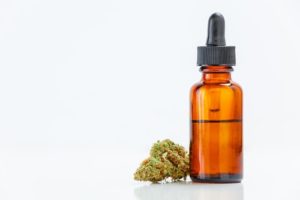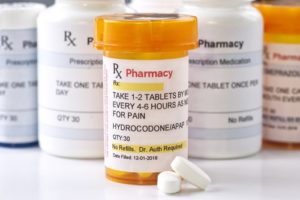For decades, the purveyors of the War on Drugs have told us that marijuana is a gateway to delinquent behaviors and stronger drugs. Television commercials during the “Just Say No” campaign of the Reagan era showed us that using pot had the same effect on our brain as an egg in a frying pan. Addiction statistics tell a different story.
While law enforcement was obsessively focusing on the perils of marijuana and other illegal drugs, opiates have exacted a far heavier toll on the health of the United States.
Now, as cannabis legalization creeps across the nation and researchers look to understand the scope of cannabinoid therapy, studies are starting to show that cannabis may be a key to defeating addiction.
Defining Addiction
The American Society of Addiction Medicine1 defines addiction as “a primary, chronic disease of brain reward, motivation, memory and related circuitry, leading to biological, psychological, social, and spiritual manifestations. Often reflected in an individual pathologically pursuing reward and/or relief by substance use and other behaviors.”
The disease of addiction currently affects over 21 million Americans, according to the American Addiction Centers2. Other shocking statistics about addiction include:
- One in eight addicts also suffers from an addiction to alcohol.
- More people experience addiction to nicotine than any other drug.
- Close to 1 million people were being treated for cocaine addiction as of 2014.
- Over 500,000 people suffer from an addiction to heroin.
- 2 million Americans struggle with addiction to prescription medications.
- Those with an addiction to prescription drugs are 40 times more likely to be addicted to heroin.
Addiction to alcohol, tobacco, illicit drugs, and prescription drugs currently costs the American public more than $800 billion3 annually, and that’s not the worst of it. In 2015, overdose became the leading cause of accidental death in the United States4, claiming more than 52,000 lives. That is triple the number from just 15 years ago. Without new advancements in addiction therapy, these figures will only escalate.
Cannabis to Combat Addiction
Skeptics argue that combating addiction by replacing the dependence of one substance with a different substance is not treating the addiction, it is merely trading one drug for another. Others, like Dr. Mark Wallace, chairman of the division of pain medicine in the department of anesthesia at the University of California San Diego, understand the trade-off. In an interview with the New York Times5, he confirmed that he has helped hundreds of people end their addiction to opiates with the use of cannabis.
Cannabis is Less Addictive Than Opiates and Other Drugs
In 1994, the National Institute on Drug Abuse6 surveyed more than 8,000 people about drug use. In this study, the research team concluded that marijuana was the least addictive drug, with only 9% of those who have used marijuana becoming addicted. While marijuana use can lead to addiction, it is rare. In fact, marijuana is less addictive than many legal substances. The most addictive substance was tobacco, showing 32% of first-time users would become addicted, while heroin came in second at 23%, followed by cocaine and alcohol at 17% and 15% respectively.
Overdosing on Cannabis is Highly Unlikely
Of the 52,000 deaths due to overdose in 2015 alone, a third were caused by prescription drugs, and another 13,000 were heroin. None of them were due to marijuana. In fact, even the DEA admits that nobody has ever died of a marijuana overdose.
Endocannabinoid and Addiction Research
A 2007 study published by researchers in Italy7 suggests that the endocannabinoid system may play a significant role not only in treating addiction to substances such as opioids, cocaine, nicotine, alcohol, and methamphetamine but also in preventing relapse. In fact, many studies suggest that cannabinoid antagonists could represent the future of treatment for drug addiction.
Crack Cocaine: A study out of the British Columbia Centre on Substance Abuse surveyed 122 crack cocaine users, and a smaller study out of Brazil studied the habits of 25 crack users. Both studies indicated that crack addicts were able to use less cocaine during times when they were consuming cannabis. Another study out of Barcelona, Spain in 20058showed how mice addicted to cocaine started using less of the drug when presented with cannabis as an alternative. Researchers collaborating in Beijing and Baltimore9 had similar findings in their research in 2011.
Alcoholism: In 2005, researchers out of Brookhaven National Laboratory10 published findings from several experiments which suggest that the endocannabinoid system, specifically the blocking of certain receptors, could prove to be an effective treatment for alcoholism. Dr. Tod Mikuriya11 published his findings in 2004 showing that 92 patients prescribed cannabis for treating alcoholism all found it effective, with nine reporting that they had abstained from alcohol for more than a year and believed cannabis helped them remain sober.
Tobacco: Research published in 2013 out of the University College London12 reported a 40% reduction of tobacco use when the participants were supplemented with cannabidiol (CBD), suggesting that the second most abundant cannabinoid found in cannabis could be an effective treatment option for those struggling with nicotine addiction.
Opiates: In an article published earlier this year in Trends in Neuroscience,13 Dr. Yasmin Hurd compels the scientific community to look more closely at the therapeutic benefits of CBD specifically because of the overdose dangers of opioids.

Legalizing Marijuana Reduces Overdoses and Use of Prescription Drugs
States that have legal cannabis are starting to see the potential of cannabinoid therapy to reduce rates of overdose and prescription use.
Statistically, legalizing cannabis has already shown an impact on the number of overdose deaths in the United States. In 2014, researchers published findings in the Journal of the American Medical Association14 showing that the states which offered legal cannabis had nearly 25% fewer deaths related to opioid overdose.
In fact, opiates are not the only drugs to see a reduction of use in states with legal marijuana. In 2016, a report was published in “Health Affairs” examining data from Medicare spending between 2010 and 2013. Researchers concluded that medical marijuana saved the Medicare program approximately $165 million in 2013 and if medical marijuana were legal nationwide it would save around $470 million. Prescriptions used to treat anxiety, depression, nausea, psychosis, seizures, sleep disorders, and spasticity also saw a decline in states where marijuana is legal.
As research continues, and we learn more about how the endocannabinoid system works to obtain homeostasis in the body and balance other systems, could cannabinoid supplementation become a more precise, safer way to treat and prevent disease? Current research is promising a much brighter future for the millions who struggle with various forms of addiction.
References:
1 American Society of Addiction Medicine. (2017). Definition of Addiction. Retrieved from American Society of Addiction Medicine: https://www.asam.org/quality-practice/definition-of-addiction=
2 American Addiction Centers. (2017). Addiction Statistics. Retrieved from American Addiction Centers: http://americanaddictioncenters.org/rehab-guide/addiction-statistics/#Statistics on Addiction to Specific Substances
3 Trends and Statistics. (2015). Retrieved from drugabuse.gov: https://www.drugabuse.gov/related-topics/trends-statistics
4 American Society of Addiction Medicine. (2015). Opioid Addiction Disease Facts and Figures. Retrieved from www.asam.org: https://www.asam.org/docs/default-source/advocacy/opioid-addiction-disease-facts-figures.pdf
5 Richtel, M. (2017, March 27). Addiction Specialists Ponder a Potential Aid: Pot. New York Times. Retrieved from https://www.nytimes.com/2017/03/27/health/marijuana-drug-addiction-treatment.html?_r=0
6 Anthony, J. (1994). Comparative Epidemiology of Dependence on Tobacco,. Experimental and Clinical Psycho pharmacology, 2(3), 244-268. Retrieved from https://pdfs.semanticscholar.org/60cd/d49b5ed6a84423762a366727ae4880c6f255.pdf
7 Parolaro, D., Vigano, D., Realini, N., & Rubino, T. (2007). Role of endocannabinoids in regulating drug dependence. Neuropsychiatric Disease and Treatment, 711-721.
8 Soria, G. e. (2005). Lack of CB1 cannabinoid receptor impairs cocaine self-administration. Neuropsychopharmacology, 1670-80.
9 Zheng-Xiong Xi, e. a. (2011). Brain Cannabinoid CB2 Receptors Modulate Cocaine’s Actions in Mice. Natural Neuroscience, 1160-66.
10 Brookhaven National Laboratory. (2005, September 11). Role Of Cannabinoid Receptors In Alcohol Abuse Examined. Science Daily.
11 Mikuriya, T. H. (2004). Cannabis as a Substitute for Alcohol:. Journal of Cannabis Therapeutics.
12 Celia J.A. Morgan, e. a. (2013). Cannabidiol reduces cigarette consumption in tobacco smokers: Preliminary findings. Addictive Behaviors, 2433-2436.
13 Hurd, Y. L. (2016). Cannabidiol: Swinging the Marijuana Pendulum From ‘Weed’ to Medication to Treat the Opioid Epidemic. Trends in Neurosciences, 124-127.
14 Marcus A. Bachhuber, M. e. (2014). Medical Cannabis Laws and Opioid Analgesic Overdose Mortality in the United States, 1999-2010. JAMA: Internal Medicine.


